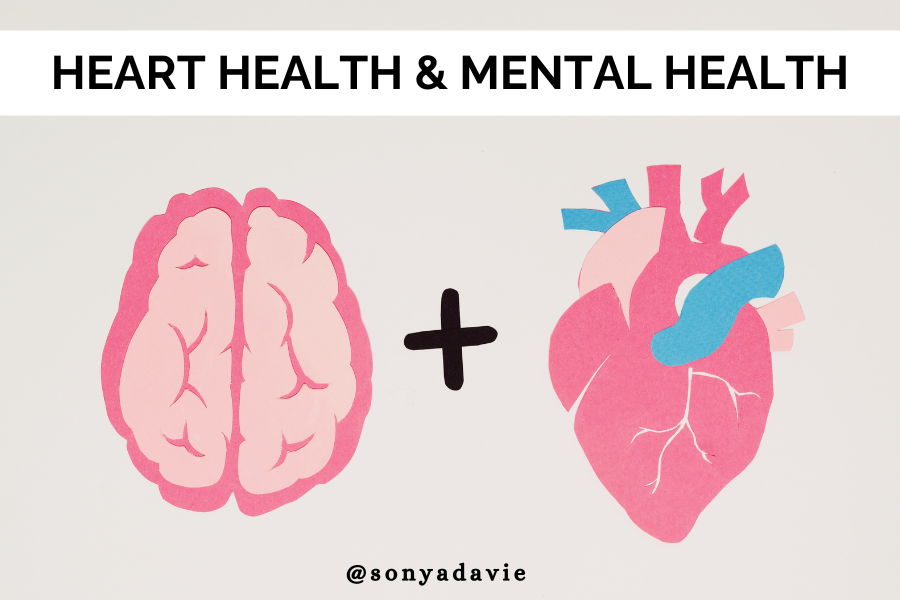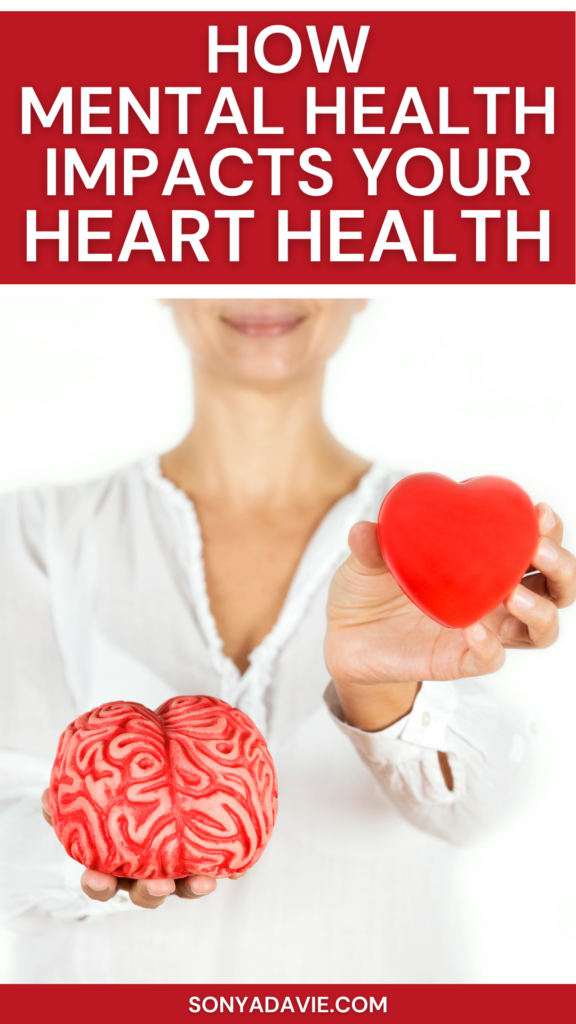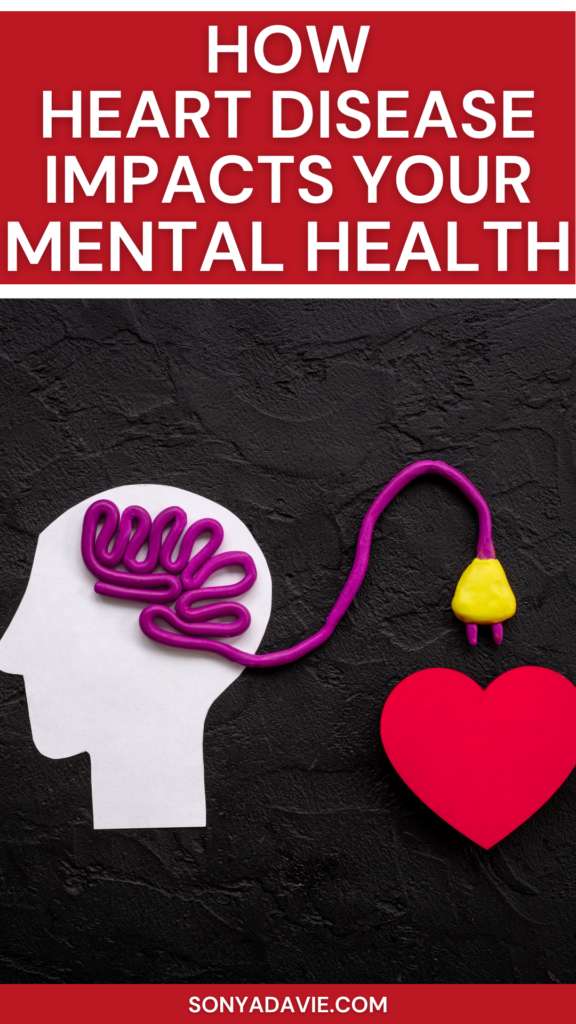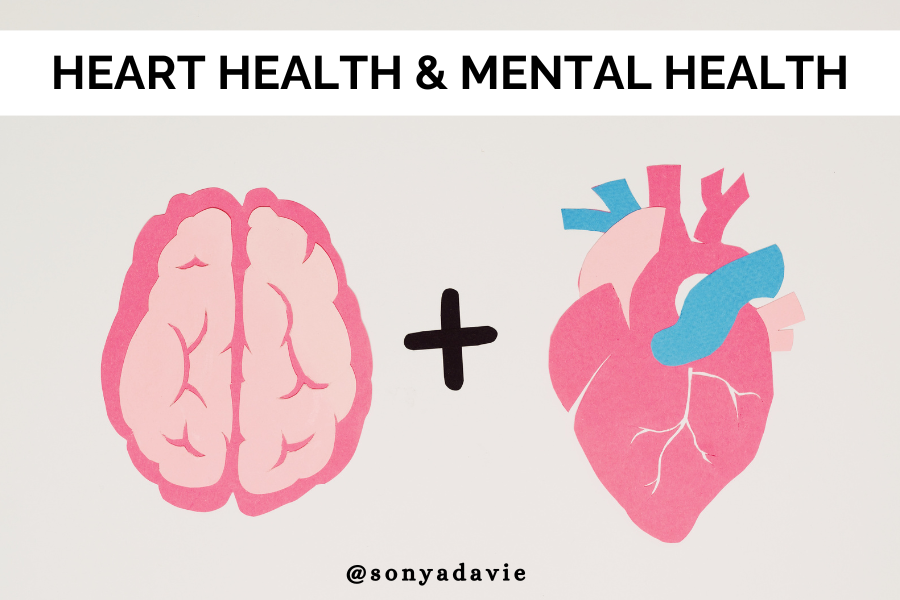It’s February—yep, the month of love!
While you’re out there showing love to others, it’s also a good time to check in on how you’re taking care of your own heart. Plus, you’ve got an extra reason to focus on that this month
— February is Heart Health Month!
But here’s something you might not know: when you take care of your heart, you’re also nurturing your mental health. The two are more connected than you might think, and February is a great opportunity to reflect on how both your heart and mind need love and attention to thrive.

This post is all about the connection between heart health and mental health.
A growing body of research backs this up: conditions like depression, anxiety, and chronic stress don’t just impact your mental well-being—they can also take a serious toll on your heart. And it goes both ways—people with cardiovascular issues are more likely to struggle with mental health challenges like depression and anxiety.
How Mental Health Impacts Your Heart
When you experience ongoing stress, anxiety, or depression, your body reacts by releasing stress hormones like cortisol and adrenaline. These hormones are designed to help you respond to immediate threats, providing a temporary boost to your energy and focus.
However, when these hormones are constantly triggered over a prolonged period, it can have a serious impact on your overall health. Chronic activation of stress hormones can lead to inflammation, higher blood pressure, and a range of cardiovascular problems.
Here’s a closer look at how mental health struggles can significantly affect your heart:
Depression – Studies have shown that depression is strongly linked to an increased risk of high blood pressure, heart attacks, and strokes. The emotional toll of depression can lead to changes in how your heart functions, with elevated stress hormones causing constriction of blood vessels and heightened inflammation, both of which increase cardiovascular risks.

Anxiety – Anxiety isn’t just a mental challenge—it can physically affect your heart too. When anxiety triggers a constant state of stress, it leads to prolonged activation of the body’s fight-or-flight response, which increases inflammation in the arteries. Over time, this puts a strain on the heart, raising the risk for high blood pressure, heart disease, and other cardiovascular issues.
PTSD (Post-Traumatic Stress Disorder) – For veterans and trauma survivors dealing with PTSD, the connection between mental health and heart health can be especially severe. PTSD is linked to a higher risk of developing hypertension (high blood pressure), arrhythmias (irregular heartbeats), and an increased likelihood of heart disease. The constant state of hypervigilance and emotional distress associated with PTSD leads to chronic activation of the body’s stress response, which takes a serious toll on the cardiovascular system.
Chronic Stress – Chronic stress is one of the most significant contributors to heart health problems. Persistent stress leads to elevated levels of cortisol, the primary stress hormone, which can cause weight gain, higher blood pressure, and an overall increased risk of heart disease. This prolonged exposure to high cortisol levels can lead to unhealthy changes in metabolism and cardiovascular function, making the heart more vulnerable to damage over time.
What the Latest Research Says
A study found that young adults struggling with depression and anxiety face a higher risk of developing heart-related conditions. Poor diet, sedentary lifestyles, and lack of stress management all contribute to this growing issue. The key takeaway? Early intervention is crucial! Prioritizing mental health care and stress management from a young age can significantly lower the risk of heart disease later in life.
Remember how we mentioned it’s a two-way street? Just as mental health can affect your heart, heart disease can also deeply impact your well-being. Let’s dive deeper into how this plays out.
How Heart Disease Impacts Your Mental Health
If you’re living with heart disease, you may be feeling the emotional weight that comes with it. The emotional impact of heart disease isn’t just about feeling down—it can affect your overall ability to heal.

Post-Heart Attack Depression – If you’ve had a heart attack, you might struggle with feelings of sadness or depression. These emotions can slow your recovery and even increase your chances of future heart issues. Taking care of your emotional health is just as important as your physical recovery.
Social Isolation and Emotional Stress – Heart disease can lead to feelings of isolation, especially if you’ve had to limit your activities or stay home more often. The anxiety about your health can also add to emotional stress, making you feel disconnected or overwhelmed. Reaching out for support can help ease the mental strain.
Heart Medications and Mood Changes – If you’re taking medications for heart disease, you may notice changes in your mood. Medications like beta-blockers or statins can cause fatigue, anxiety, or depression in some people. If you’re experiencing these side effects, talk to your doctor—they may be able to adjust your treatment to help you feel better mentally.
How to Protect Your Heart & Mind
The good news? There are plenty of ways to reduce stress and keep both your mental and heart health in check. Here’s what you can do:
7 Mind and Heart Healthy Tips You Can Do Today
#1 Manage Stress Effectively
Practice stress-reducing techniques like meditation, deep breathing, or yoga to keep your heart and mind healthy.
#2 Stay Physically Active
Regular exercise helps reduce stress, improve mood, and strengthen your heart. Activities like walking, swimming, and strength training are great options.
#3 Adopt a Heart-Healthy Diet
Eat a balanced diet rich in whole foods, fruits, vegetables, lean proteins, and healthy fats to support cardiovascular and mental well-being.
#4 Prioritize Quality Sleep
Lack of sleep can increase stress, raise blood pressure, and negatively affect mental health. Aim for 7–9 hours of rest each night.

#5 Build Strong Social Connections
Having a support system can reduce feelings of stress and improve heart health. Stay connected with loved ones, join community groups, or seek therapy if needed.
#6 Limit Alcohol and Caffeine
Excessive alcohol and caffeine consumption can lead to increased heart rate, anxiety, and high blood pressure. Moderation is key.
#7 Seek Professional Help When Needed
If you struggle with depression, anxiety, or chronic stress, working with a therapist or counselor can help you develop coping strategies that benefit both your mental health and heart health.
The Importance of Supplements for Your Overall Health
A balanced diet and regular exercise are essential for heart health, but sometimes, your body needs an extra boost. Supplements can play a crucial role in filling nutritional gaps, supporting cardiovascular function, and improving overall well-being. Here are some of my personal favorites that I highly recommend:
Creatine
Studies suggest that creatine can help lower homocysteine levels, a compound linked to heart disease, stroke, and other cardiovascular concerns.
Vitamin D & K2
Research indicates that Vitamin K2 and D3 may help slow the progression of coronary artery calcification, potentially offering a new preventive approach against cardiovascular disease.
Berberine
A powerhouse supplement with roots in traditional Chinese medicine, Berberine has shown promise in supporting cardiovascular health. Studies suggest that it can help regulate blood sugar levels and may even reduce the risk of cardiovascular disorders.
To explore these and other high-quality supplements, check out my Thorne dispensary link.
You can create a free account and start browsing for the wellness support your body needs.
⚠ Disclaimer: This content is for informational purposes only and is not intended to replace medical advice. Always consult with your healthcare provider before starting any new supplement regimen.
Prioritizing your heart health goes beyond diet and exercise—choosing the right supplements can give you the extra support your body deserves!
This Month of Love, Take Care of Yourself and Your Loved Ones
And as we celebrate February, the month of love, it’s the perfect reminder to not only show love to those around you but to prioritize your own well-being as well. Heart health and mental health are closely linked, with poor cardiovascular function contributing to depression, anxiety, and even cognitive decline.
But don’t worry, managing stress, exercising, and nourishing your body with a heart-healthy diet can benefit both your heart and brain, improving your overall well-being.

To help you kick off your wellness journey, here are 29 heart-healthy essentials to support you and your loved ones this February—Red Heart Month!
Yoga Leggings
Comfortable and stretchy, these leggings are perfect for your yoga practice and any other workout.
Healthy Fruits Blender/Shakes
Blend up your favorite fruits for a nutritious, heart-healthy shake to kickstart your day.
Running Shoes
Support your runs with shoes designed for comfort, stability, and injury prevention.
Running Caps
Stay protected from the sun and sweat-free with stylish and functional running caps.
Fitness Outfits
Stylish and breathable outfits that keep you moving comfortably throughout your workout.
And many more! For more heart-healthy essentials, check out my full collection here.
Here’s the Bottom Line:
The connection between heart health and mental health is undeniable.
Taking care of one benefits the other, and together, they form the foundation for a healthier, happier life.
Despite the daily chaos, prioritize your heart and mind, and you’ll feel the positive impact on your overall well-being.
If you’re looking for more tips on maintaining both mental and heart health, be sure to explore our other wellness resources! ❤️
Click Here – Sonya Davie Wellness Blogs

This post is all about the connection between heart health and mental health.
⚠ Disclaimer: This information is for educational purposes only and should not be considered medical advice. Always consult your healthcare provider before beginning any new supplement regimen.
+ show Comments
- Hide Comments
add a comment